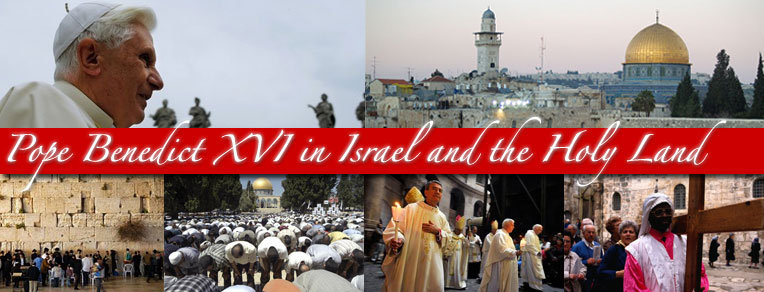 "This trip may be pope's last chance to see the land of the Bible", says John Allen, Jr. in one of his characteristically all-encompassing and substantial analyses of the papal visit and its implications for Catholic-Jewish, Catholic-Muslim, and Israeli-Palestinian relations.
"This trip may be pope's last chance to see the land of the Bible", says John Allen, Jr. in one of his characteristically all-encompassing and substantial analyses of the papal visit and its implications for Catholic-Jewish, Catholic-Muslim, and Israeli-Palestinian relations.Further complicating Benedict’s peace-making effort is the Vatican’s reputation among many Israelis as less than a fair broker. Officially, the Holy See is even-handed: it supports the right of both Israelis and Palestinians to sovereignty and security, and calls for an “internationally guaranteed special status” for the holy places that does not prejudice the question of whether Jerusalem should be the capital of Israel, a Palestinian state, or both.One of his journalistic strengths I find is in presenting in a fair manner the perspectives (and grievances) of all parties:In reality, however, the Vatican has long been sort of a mirror image of American Evangelicals: A Christian force in the West that, for reasons both theological and political, takes a keen interest in the Middle East, only in this case tending to favor the Palestinians rather than the Israelis. (One small but telling symbol of where the Vatican’s heart lies is that an ivory set of the Stations of the Cross, which currently adorn the chapel of the Synod Hall, were a gift to John Paul II from Arafat.)
This pro-Palestinian tilt is informed by a variety of factors, but probably none so decisive as the simple fact that the Christians on the ground, from whom the Vatican often takes its cues, are mostly Palestinians. If Christianity is to have a future in the Holy Land, its center of gravity will inevitably be in a Palestinian state.
Perceptions of pro-Palestinian bias have long been a sore point in Vatican/Israeli relations, most recently when a senior Vatican official compared the Israeli presence in the Gaza Strip to a “giant concentration camp.” That was hardly unprecedented: In the spring of 2002, Israel repeatedly protested L’Osservatore Romano’s insistence on referring to a standoff at the Basilica of the Nativity in Bethlehem as an Israeli “siege,” even though it began when Palestinian gunmen stormed the church. In July 2005, when Israel complained that Benedict XVI had not included an Israeli town on a list of places hit by recent terror attacks, a Vatican spokesperson testily replied that the pope was reluctant to denounce such attacks for fear of legitimizing disproportionate military responses from Israel that violate international law.Just in the last few days, Israelis objected that the Vatican has chosen to participate in the U.N.’s “World Conference Against Racism” in Geneva April 20-24, rather than joining the United States, Canada, Italy, and other nations in distancing themselves from the event (also known as the “Durban Review Conference”) on the grounds that it equates Zionism with racism, and singles out Israel for blame.
If the Catholic church wishes to serve as a catalyst for peace, its leadership obviously must convince both Israelis and Palestinians of their impartiality. Benedict thus has to walk a tightrope: Reassuring Israelis that he’s sympathetic to them, despite the history sketched above, while not creating alarm among Palestinians that the Vatican is abandoning their cause.










No comments:
Post a Comment